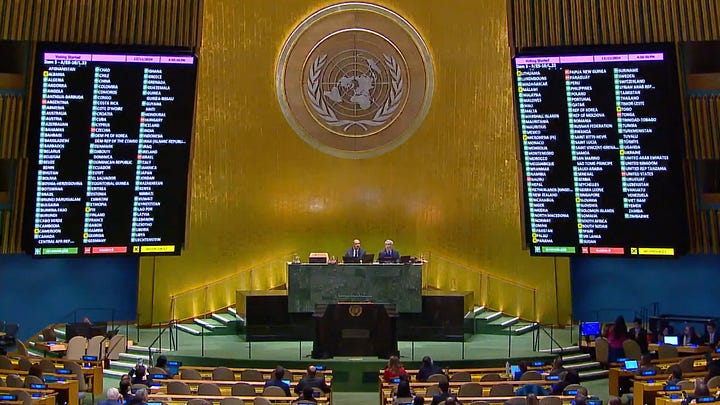Syria's UN Votes: Casted by a Displaced Regime or a Terrorist Organization?
Who Represents Syria at the UN today?
Who Represents Syria at the UN today?
The recent developments in Syria have raised significant questions about the legitimacy and representation of its government on the international stage. Despite the collapse of Bashar al-Assad's regime, Syria managed to cast two votes today at the United Nations against Israel in UNGA resolutions. This situation prompts a critical question: who exactly is representing Syria in these votes? Is it the inexistent Assad's government, or is it on behalf Abu Mohammad al-Joulani, the leader of Hay'at Tahrir al-Sham (HTS), an entity recognized internationally as a terrorist organization?
A swift offensive by opposition forces culminated in the announcement that Assad had fled the country, effectively ending his family's decades-long rule. This rapid transition has left al-Joulani and HTS in control of the country. The United Nations General Assembly's recent resolutions calling for actions against Israel were passed with Syria's participation and voting in favor of the resolutions, despite lacking a government. This raises profound concerns regarding the legitimacy of such votes. Are they reflective of a Free Syrian state, or do they represent the interests of a terrorist organization?
Syria's current political landscape and UN votes poses several implications:
Legitimacy of Votes: If Syria is voting under the influence of HTS, it raises questions about the legitimacy of those votes on international matters, particularly considering HTS is labeled a terrorist organization and broader Middle Eastern geopolitics.
International Recognition: The international community must grapple with recognizing which factions are truly representing Syrian at the UN. HTS is labeled a terrorist organization, questioning any potential recognition or support.


In summary, the current situation in Syria poses profound challenges to international governance and representation. As a country without a legitimate government, now under the influence of a recognized terrorist organization, the question of how Syria is allowed to maintain a voice at the United Nations is troubling. This scenario not only undermines the integrity of UN processes but also highlights the urgent need for a reevaluation of how international bodies engage with entities that do not represent the values of the UN charter.




